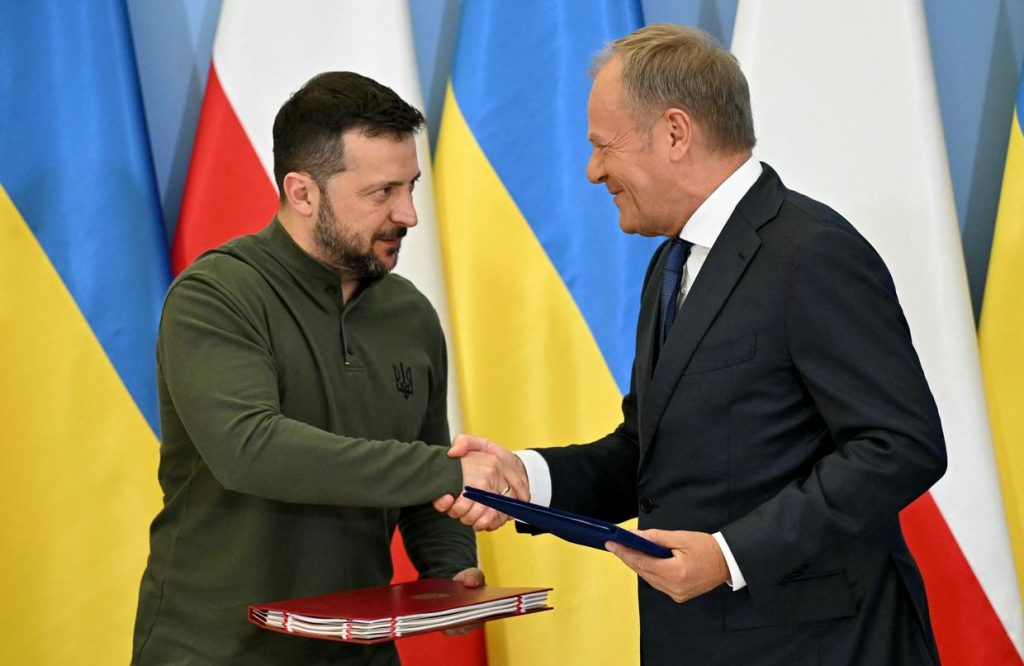Despite U.S. President-elect Donald Trump’s ceasefire plans for Ukraine, Polish Prime Minister Donald Tusk emphasized that decisions about Ukraine’s future cannot be made without the involvement of Ukrainians themselves. Trump’s proposals for Ukraine, including freezing the current front line and deploying British and European troops, are still in the discussion stages. Tusk stressed the importance of Ukraine determining the parameters of the path to a comprehensive, just, and sustainable peace, while Europe will have to take on more responsibility for its security. Ukraine’s Foreign Affairs Ministry expressed gratitude for Tusk’s commitments and reiterated the necessity of Ukrainian involvement in decision-making regarding the war. Trump’s previous statements about ending the war in Ukraine in a short period of time have not been accompanied by a clear path, and there are conflicting views on whether he would continue U.S. support for Ukraine.
Hungarian Prime Minister Viktor Orban suggested that Trump would not continue U.S. support for Ukraine, while French Foreign Affairs Minister Jean-Noël Barrot claimed that Trump would not abandon Ukraine and was too wise to agree to the largest territorial annexation in 75 years. Despite the differing opinions, it is clear that lasting peace would not be possible if decisions were made without the involvement of Ukraine and Europe, as emphasized by Barrot. Ukrainian leadership has publicly stated its intention to restore the country’s 1991 borders, including the liberation of Crimea and parts of Donbas occupied by Russia since 2014. Russian Deputy Foreign Minister Sergei Ryabkov indicated that Russia was willing to listen to Trump’s proposals, but warned that there would be no simple solution. The current phase of the conflict remains precarious, with Russia at the peak of its offensive in 2024.
A senior advisor to Donald Trump suggested that Ukraine needs to be realistic in its war aims, acknowledging that the Russian-occupied peninsula of Crimea is essentially lost. This perspective raises questions about the feasibility of Ukraine’s plan to restore its 1991 borders, highlighting the challenges of navigating the complex geopolitical dynamics in the region. Trump’s stance on the conflict in Ukraine remains unclear, with conflicting views from various leaders and officials. While there are concerns about the potential consequences of decisions being made without proper consultation with all stakeholders, there is also recognition of the need for a comprehensive and just peace in the region. The involvement of Ukraine in determining its future path is crucial, and any decisions made must take into account the interests and aspirations of the Ukrainian people.
It is evident that the situation in Ukraine is multifaceted and requires careful consideration from all parties involved. The conflicting views on Trump’s approach to the conflict reflect the complexities of international relations and the challenges of finding a sustainable solution to the ongoing crisis. The role of Europe in ensuring its own security in the face of regional instability is also underscored by Tusk’s statements. The need for Ukraine to have a seat at the table in discussions about its future highlights the importance of self-determination and sovereignty in shaping the country’s trajectory. With tensions continuing to simmer in the region, it is imperative that all stakeholders work towards a peaceful resolution that respects the interests and rights of all involved parties.
As discussions about Ukraine’s future unfold, it is crucial for the international community to prioritize diplomatic efforts and dialogue to prevent further escalation of the conflict. The uncertainty surrounding Trump’s plans for Ukraine underscores the need for clear and transparent communication from all parties involved. Trump’s commitment to ending the war in Ukraine is a positive step, but the lack of a concrete strategy raises concerns about the feasibility of achieving lasting peace in the region. The involvement of key stakeholders, including Ukraine, Europe, and Russia, is essential in finding a viable path forward that addresses the root causes of the conflict and promotes stability and security in the region. By working together and engaging in constructive dialogue, there is hope for a resolution that respects the sovereignty and aspirations of the Ukrainian people while promoting peace and stability in the region.


